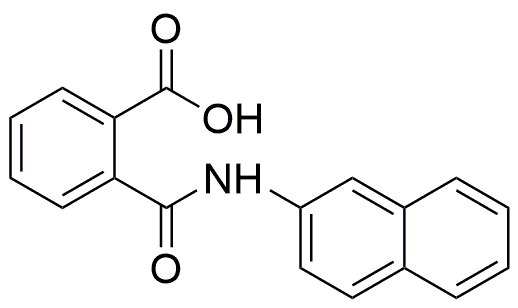N-(1-Naphthyl)phthalamic acid is widely utilized in research focused on:
- Plant Growth Regulation: This compound acts as a plant growth regulator, helping to manage the growth and development of various crops. It is particularly useful in enhancing root development and improving overall plant health.
- Pharmaceutical Research: It serves as a valuable intermediate in the synthesis of pharmaceuticals, particularly in the development of drugs targeting specific biological pathways, making it essential for medicinal chemistry.
- Analytical Chemistry: Employed in analytical methods, it aids in the detection and quantification of certain compounds, enhancing the accuracy of chemical analyses in laboratories.
- Polymer Chemistry: This chemical is used in the formulation of specialized polymers, contributing to materials with unique properties, such as improved thermal stability and mechanical strength.
- Environmental Studies: It is utilized in studies assessing the impact of pollutants on plant life, providing insights into ecological health and the effects of chemical exposure on flora.
Informations générales
Propriétés
Sécurité et réglementation
Applications
N-(1-Naphthyl)phthalamic acid is widely utilized in research focused on:
- Plant Growth Regulation: This compound acts as a plant growth regulator, helping to manage the growth and development of various crops. It is particularly useful in enhancing root development and improving overall plant health.
- Pharmaceutical Research: It serves as a valuable intermediate in the synthesis of pharmaceuticals, particularly in the development of drugs targeting specific biological pathways, making it essential for medicinal chemistry.
- Analytical Chemistry: Employed in analytical methods, it aids in the detection and quantification of certain compounds, enhancing the accuracy of chemical analyses in laboratories.
- Polymer Chemistry: This chemical is used in the formulation of specialized polymers, contributing to materials with unique properties, such as improved thermal stability and mechanical strength.
- Environmental Studies: It is utilized in studies assessing the impact of pollutants on plant life, providing insights into ecological health and the effects of chemical exposure on flora.
Documents
Fiches de données de sécurité (FDS)
La FDS fournit des informations de sécurité complètes sur la manipulation, le stockage et l’élimination du produit.
Spécifications du produit (PS)
Le PS fournit une description complète des propriétés du produit, notamment sa composition chimique, son état physique, sa pureté et les exigences de stockage. Il détaille également les plages de qualité acceptables et les applications prévues du produit.
Certificats d'analyse (COA)
Recherchez des certificats d'analyse (COA) en saisissant le numéro de lot du produit. Les numéros de lot et de lot se trouvent sur l'étiquette d'un produit, après les mots « Lot » ou « Lot de fabrication ».
Numéro de catalogue
Numéro de lot/série
Certificats d'origine (COO)
Ce certificat d'exploitation confirme le pays dans lequel le produit a été fabriqué, et détaille également les matériaux et composants utilisés et s'il est issu de sources naturelles, synthétiques ou autres sources spécifiques. Ce certificat peut être requis pour les douanes, le commerce et la conformité réglementaire.
Numéro de catalogue
Numéro de lot/série
Fiches de données de sécurité (FDS)
La FDS fournit des informations de sécurité complètes sur la manipulation, le stockage et l’élimination du produit.
DownloadSpécifications du produit (PS)
Le PS fournit une description complète des propriétés du produit, notamment sa composition chimique, son état physique, sa pureté et les exigences de stockage. Il détaille également les plages de qualité acceptables et les applications prévues du produit.
DownloadCertificats d'analyse (COA)
Recherchez des certificats d'analyse (COA) en saisissant le numéro de lot du produit. Les numéros de lot et de lot se trouvent sur l'étiquette d'un produit, après les mots « Lot » ou « Lot de fabrication ».
Numéro de catalogue
Numéro de lot/série
Certificats d'origine (COO)
Ce certificat d'exploitation confirme le pays dans lequel le produit a été fabriqué, et détaille également les matériaux et composants utilisés et s'il est issu de sources naturelles, synthétiques ou autres sources spécifiques. Ce certificat peut être requis pour les douanes, le commerce et la conformité réglementaire.


